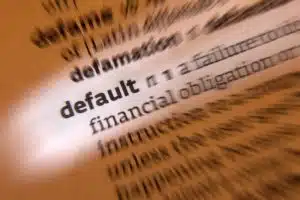
Legal action that can be taken against you, this could impact on your credit score, and other potential consequences include recovery action by the lender to recover the outstanding amount on your loan.
The lender give you a number of opportunities to being your account unto date before they press for legal action, you will receive a number of telephone calls, texts, emails and letters informing you of the outstanding amounts on your loan.
Lenders in most cases are happy for you to bring the account up-to date before they issue a default on your credit score.
What is defaulting on a merchant cash advance?
Defaulting on a merchant cash advance means that a borrower has failed to make the required payments on their loan agreement with the MCA provider. This can happen when a business owner takes out an MCA to fund their operations or expansion but struggles to generate enough revenue to pay back the loan on time.
In crude terms, defaulting on an MCA is like bouncing a cheque or failing to pay a credit card bill. For example, if a restaurant owner takes out an MCA to buy new equipment and pay staff salaries but then experiences a drop in sales due to unforeseen circumstances, they may struggle to make the payments on time and ultimately default on the loan.
This can have serious consequences for the business, including damage to their credit score and legal action taken by the MCA provider to collect the debt.
Consequences of defaulting on a merchant cash advance
Defaulting on a merchant cash advance can have serious consequences for a business owner. Some of the potential consequences of defaulting on a merchant cash advance include:
- Legal action: The provider may take legal action against the business owner to recover the outstanding balance. This can include seeking a court judgment or filing a lawsuit.
- Damaged credit score: Failure to repay the advance can result in a negative impact on the business owner’s credit score, making it harder to obtain credit in the future.
- Loss of collateral: In some cases, the merchant cash advance may be secured by the business owner’s assets, such as equipment or property. Failure to repay the advance can result in the loss of these assets.
- Harassment from collection agencies: The merchant cash advance provider may use collection agencies to attempt to recover the debt. This can result in frequent phone calls and letters, which can be stressful for the business owner.
- Additional fees and charges: Defaulting on a merchant cash advance can result in additional fees and charges, such as late fees and penalty interest. These fees can increase the overall cost of the advance and make it even harder to repay.
Preventing defaulting on a merchant cash advance
Preventing defaulting on a merchant cash advance is important for the financial health of your business. Here are some suggestions on how to avoid defaulting:
- Communicating with the lender: If you are having trouble making payments, it is important to communicate with your lender as soon as possible. They may be able to work with you to find a solution, such as adjusting the payment schedule or reducing the interest rate.
- Exploring alternative financing options: If your business is struggling to make payments on a merchant cash advance, it may be worth exploring other financing options. These could include a traditional bank loan, a line of credit, or a small business administration loan.
- Proper planning and management of cash flow: One of the most effective ways to avoid defaulting is to ensure that your business has sufficient cash flow to cover expenses. This means tracking income and expenses, projecting future cash flow, and creating a budget to manage cash flow effectively.
- Negotiating revised terms: If you are struggling to make payments, it may be possible to negotiate revised terms with your lender. This could include adjusting the repayment schedule, lowering the interest rate, or reducing the amount of the loan. However, it is important to approach this conversation with your lender carefully, and to ensure that any new terms are realistic and manageable for your business.
What to do if you default on a merchant cash advance
Defaulting on a merchant cash advance can be a challenging situation to navigate. Here are some steps you can take if you find yourself in this situation:
- Seeking legal advice: It is important to seek legal advice if you default on a merchant cash advance. A lawyer can help you understand your legal rights and obligations, and advise you on the best course of action.
- Negotiating a settlement: If you default on a merchant cash advance, you may be able to negotiate a settlement with the lender. This could involve agreeing to a repayment plan that works for both parties. It is important to be upfront and honest with the lender about your financial situation, and to work together to find a solution that works for everyone.
- Repaying the debt: If you default on a merchant cash advance, the lender may take legal action to recover the debt. This could involve seizing assets, taking legal action, or even winding up your business. It is important to act quickly to avoid these consequences, and to work with the lender to find a solution that works for both parties.
Read more: Merchant cash advance or business loan?
Frequently asked questions
What should I do if I default on a merchant cash advance?
If you default on a merchant cash advance, it is important to seek legal advice, negotiate a settlement, and work towards repaying the debt. It is important to act quickly and communicate with the lender to find a solution.
Will defaulting on a merchant cash advance affect my credit score?
Yes, defaulting on a merchant cash advance can have a negative impact on your credit score. It can stay on your credit report for up to six years and can affect your ability to get approved for future financing.
Can I negotiate revised terms after defaulting on a merchant cash advance?
It is possible to negotiate revised terms after defaulting on a merchant cash advance. However, it may depend on the lender's willingness to work with you and your ability to make payments on the revised terms.
Conclusion
In conclusion, defaulting on a merchant cash advance can have serious consequences for businesses. It is essential for business owners to understand the risks and consequences of defaulting, and to take steps to prevent default from occurring. Communication with the lender, exploring alternative financing options, proper planning and management of cash flow, and negotiating revised terms can help prevent default.
However, if default does occur, seeking legal advice, negotiating a settlement, and repaying the debt should be considered. Business owners should carefully consider their financing options and seek professional advice to ensure they make the best decisions for their business. By taking a proactive approach to managing debt, businesses can avoid the negative consequences of defaulting on a merchant cash advance.
Lee Jones is a seasoned Business Finance Specialist with over two decades of invaluable experience in the financial sector. With a keen eye for market trends and a passion for helping businesses thrive, Lee has become a trusted advisor to countless organizations seeking to navigate the complexities of finance.


